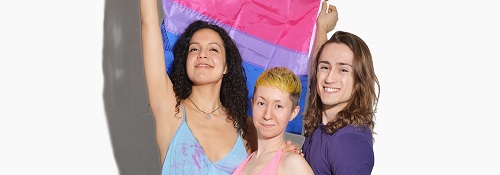 Something for everyone at this Toronto bi- and pansexual themed cabaret
Something for everyone at this Toronto bi- and pansexual themed cabaret
Walking into the Buddies in Bad Times Theatre, I will admit I was giddy. I’d heard about Too Queer: A Bi Visibility Cabaret after its initial show back in 2014, but this was my first time going — and as part of Pride, no less!
It’s a showcase of performances including poetry, dance, burlesque, song and visual art by and for people under the bi- and pansexual umbrella. Being bisexual myself, I wanted to know what it meant to other people to be bisexual. Settling into my seat, I knew I wouldn’t be disappointed.
Buddies is an accessible space, with ramps that lead to the main doors of the box office and one leading into the Cabaret Space. Accessibility didn’t stop there. The tickets were available on a sliding scale for students, arts workers and underemployed folk. It was also encouraged to go scent free for anyone with chemical sensitivities. As I went to the lower floor washrooms, I noticed the signs were just photos of people who didn’t appear gendered at all.
Hung on the stair railing to the second floor of the Cabaret Space was a framed painting of a zombie. The room bustled noisily as people grabbed their drinks at the bar and caught up with friends. Sitting there quietly by myself, I still felt a warm feeling of community.
The lights dimmed and the host Franny McCabe-Bennett took the stage. Probably the only complaint I had for the entire evening was the repeated mention of “allies” in the introduction. Remembering this was for Pride, I shrugged it off and that feeling was soon replaced with warm surprise when they acknowledged the traditional land among their thank yous.
The informal nature of the venue did not overshadow the quality of the performances. Each one was thoughtful: some were humorous, while others had me holding back tears, like when Olive-or-Oliver sang: “You did a hard thing and I’m proud of you.” During intermission I watched them get approached by a man who sat in front of me, who brought them to his companion. This older woman, whom I’d seen dabbing her eyes through the song, just stood up and hugged them. I understood. I felt validated and whole.
If tear-jerkers are too much for you, the heavier performances were broken up with lighter interpretations of the theme. Maddie Alexander performed what I considered a reverse strip to Shania Twain’s Man! I Feel Like a Woman. They strutted around on stage, recreating a dressing up montage, switching from a sequined bra to a fabulously feminine ensemble, only to disappear behind the curtain, emerge renewed in a sports bra, and shimmy into camouflage cargo pants and t-shirt. I cheered loudly, recognizing my own daily routine while straddling the lines of femininity and masculinity.
On top of great performances by both queer and straight ally performers, I have to applaud the diversity I saw: disabled, genderfluid and genderqueer, people of colour. It didn’t ignore the intersections of sexuality and other parts of identity. And it didn’t rely on tired stereotypes or ignoring bi- and pansexual men.
No matter what your sexual orientation, it didn’t matter, there was something to relate to. And it didn’t hurt to see babes like Kage Wolfe and Bianca Boom Boom strip down on stage too. I guess that’s why the production advises against being anyone under the age of fourteen.
Photo of Camila Diaz-Varela, Katie Sly, and Nathan Street by Greg Wong
